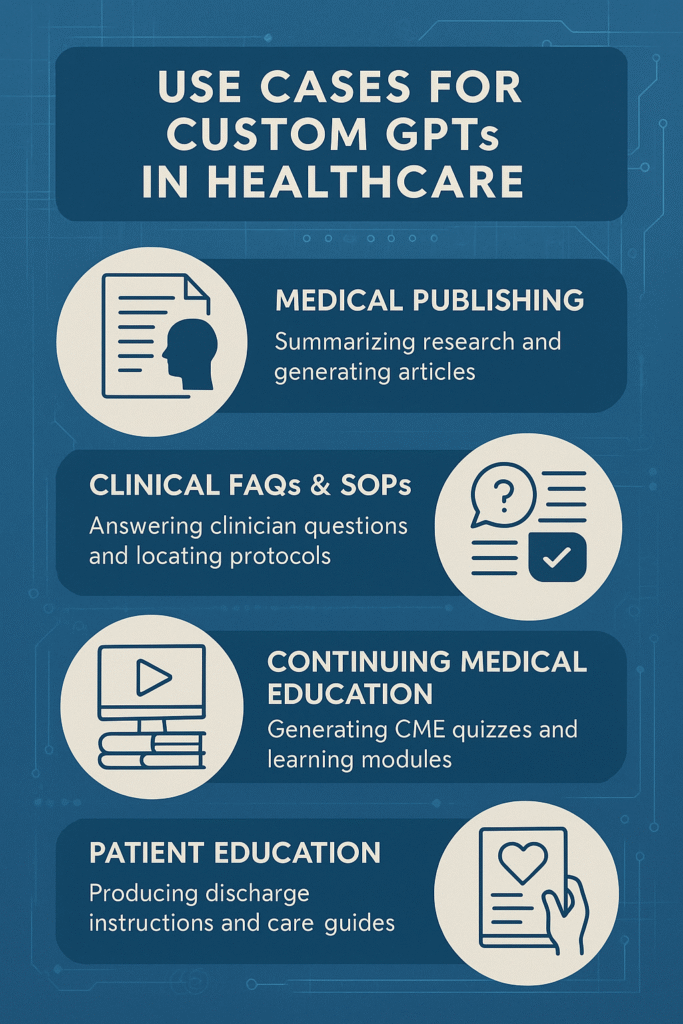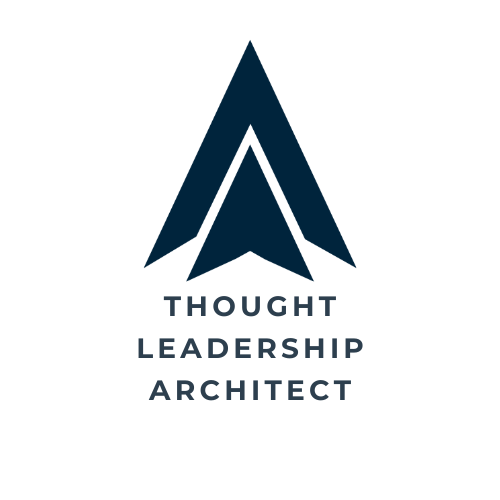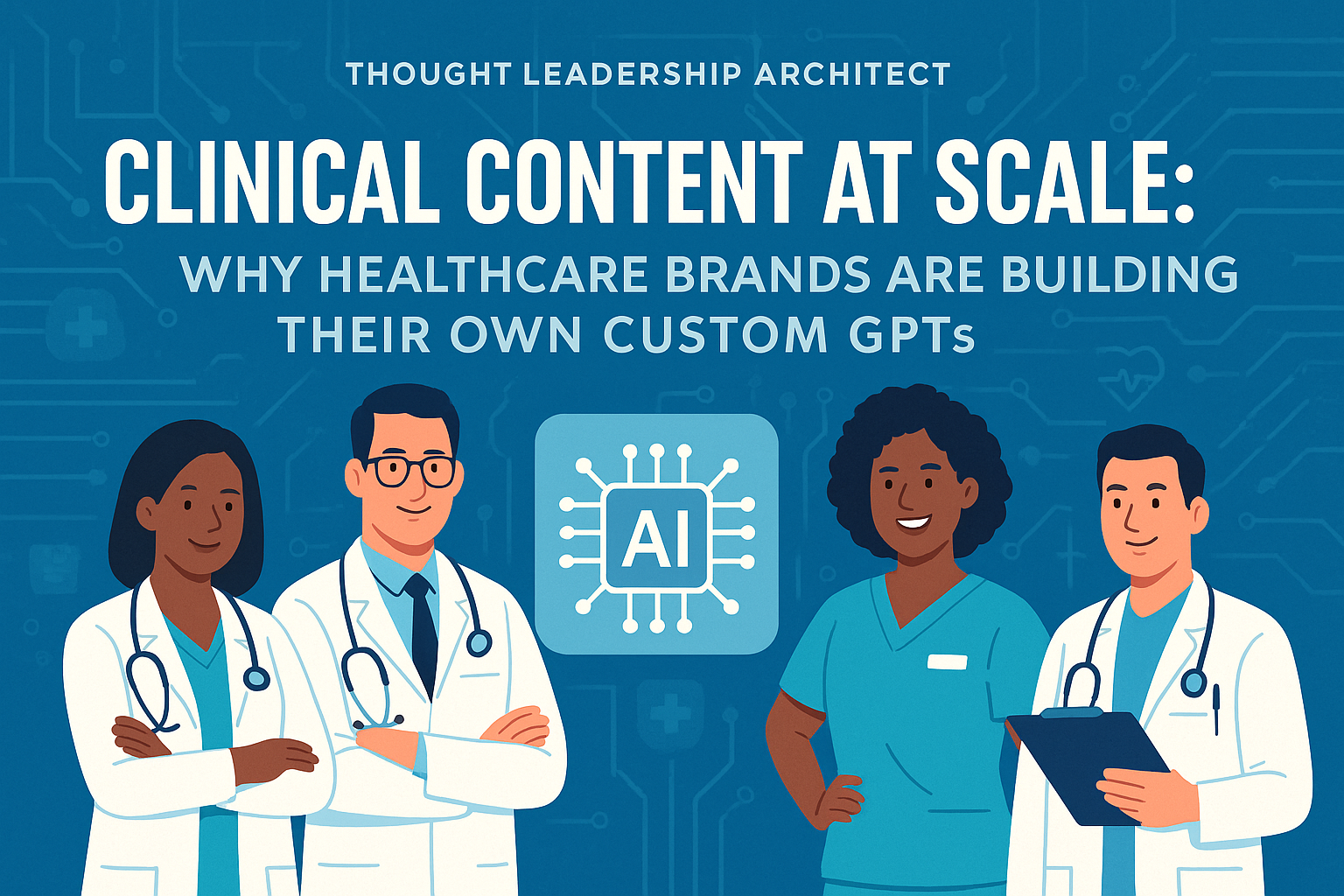In a field where every word matters and every second counts, healthcare organizations are turning to a surprising ally: custom GPTs.
Gone are the days of relying solely on human teams to manually produce educational materials, answer clinical FAQs, or maintain SOP libraries. In 2025, forward-thinking healthcare brands—from hospital systems to pharmaceutical leaders—are building their own large language models (LLMs) to scale clinical content generation with speed, accuracy, and compliance.
This isn’t just a tech trend. It’s a strategic advantage in a sector where knowledge must move as fast as innovation.
What Are Custom GPTs—And Why Now?
Custom GPTs (Generative Pre-trained Transformers) are large language models trained or fine-tuned on proprietary data, brand tone, and expert content. Unlike generic AI assistants, these models:
- Understand your specific clinical terminology
- Align with your brand’s voice, style, and compliance needs
- Adapt to your organizational workflows (SOPs, CME, patient education, etc.)
- Scale output instantly across departments, teams, and platforms
“Generic AI can’t speak the language of your institution. Custom GPTs can,” explains Dr. Julian Ortega, Director of Medical AI Systems at Global HealthWorks. “They become your digital subject matter expert—available 24/7.”
Why Healthcare Needs Scalable Content Solutions
The content burden in modern healthcare is massive—and growing:
- New treatments, guidelines, and protocols emerge weekly
- Patient education must be multilingual, readable, and culturally sensitive
- CME content needs constant updates to retain accreditation
- Clinician FAQs, SOPs, and technical documentation require version control and customization
All of this must be:
- Accurate
- Up-to-date
- Auditable
- Compliant with HIPAA, FDA, GDPR, and internal quality standards
And it must be done fast.
“We’re producing more medical knowledge per week than we did per year a decade ago,” says Dr. Elise Tran, a physician educator at a top U.S. academic hospital. “Manual content systems simply can’t keep up.”

Real-World Use Cases: Where Custom GPTs Deliver Immediate Value
1. Medical Publishing & Knowledge Management
Hospitals and research institutions are using GPTs to:
- Summarize clinical studies
- Translate complex findings for public or press release use
- Draft literature reviews for grant proposals
- Auto-generate evidence summaries for clinical decision-making
Example: A European academic medical center created a GPT that summarizes internal research into plain language for patients, media, and funders—reducing staff workload by 40%.
2. Clinical FAQs & SOP Libraries
Clinicians often waste hours searching for updated SOPs or asking the same procedural questions.
A custom GPT can:
- Act as an internal assistant for staff, pulling answers from approved internal documentation
- Deliver precise answers with source citations and timestamps
- Flag when an SOP hasn’t been updated within its compliance window
Bonus: Multilingual capability for diverse teams and global operations.
3. Continuing Medical Education (CME)
Custom GPTs support CME production by:
- Drafting quiz questions based on medical articles or lectures
- Summarizing key learning points
- Converting transcripts into modules
- Personalizing pathways based on specialty, region, or experience level
“With our AI assistant, we reduced CME content turnaround from 8 weeks to 5 days,” says Angela Mendez, Head of Learning and Development at MedNova CME Institute. “It’s still peer-reviewed—but now we start with a draft instead of a blank page.”
4. Patient-Facing Educational Content
Health systems are deploying GPTs to:
- Personalize post-op care guides
- Generate discharge instructions
- Explain lab results
- Produce wellness blogs, newsletters, and FAQs at scale
Importantly, the content is:
- Written at the correct reading level
- Available in multiple languages
- Tailored to the hospital’s brand tone (reassuring, instructional, supportive, etc.)
Strategic Benefits: The Business Case for Custom GPTs in Healthcare
✅ Efficiency & Scalability
Create hundreds of high-quality outputs in minutes—across multiple departments and channels.
✅ Consistency & Brand Alignment
Ensure tone, language, and clinical guidelines stay consistent—whether for patients, providers, or press.
✅ Regulatory Compliance
Log outputs, reference sources, and maintain audit trails. GPTs can be trained to include disclaimers, usage boundaries, and version control tags automatically.
✅ Competitive Differentiation
In a crowded healthcare market, custom AI gives your organization a tech-forward edge with real-world ROI.
What About Accuracy, Safety, and Risk?
Custom GPTs offer significant control—but they must be implemented responsibly.
Best Practices Include:
- Use curated, peer-reviewed content as training data
- Integrate human-in-the-loop oversight for high-risk outputs
- Create approval workflows for clinical claims or public-facing messages
- Train models to cite sources, flag uncertainties, and avoid overstepping scope
“It’s not about AI replacing clinicians or content teams,” says Dr. Noelle Singh, Clinical AI Advisor at MedEthics Alliance. “It’s about giving them a first draft—so they can focus on accuracy, nuance, and patient impact.”
Building Your Own Custom GPT: What You’ll Need
- A corpus of internal content
SOPs, patient education documents, CME transcripts, research articles, FAQs, etc. - A clearly defined use case
Start small—e.g., “draft discharge instructions for orthopedic patients.” - Governance framework
Define who owns the model, who reviews output, and how it’s updated. - Security & privacy protocols
Ensure compliance with HIPAA/GDPR using private APIs or on-premise deployment. - Feedback and improvement loop
Let users rate outputs, flag issues, and contribute to the model’s growth.
Looking Ahead: GPTs as Core Clinical Infrastructure
Within five years, we expect:
- Every hospital and pharma brand to maintain at least one proprietary GPT
- GPTs embedded in EHR systems, call centers, learning portals, and marketing
- GPT outputs automatically personalized by specialty, role, location, and risk level
- AI literacy becoming a core competency for medical communications and compliance teams
“This is the dawn of AI-enabled knowledge infrastructure,” says Dr. Tomás Greer, author of The Future of Clinical Communication. “Smart organizations aren’t asking if they’ll build a custom GPT—they’re asking how fast.”
Key Takeaways
- Custom GPTs are enabling healthcare brands to scale content creation across clinical, educational, and patient-facing use cases.
- Benefits include speed, consistency, cost savings, and compliance readiness.
- Key use cases: medical publishing, SOP access, CME generation, and patient education.
- Ethical implementation requires governance, human oversight, and privacy protocols.
- Organizations that lead in this area will set a new standard for communication, education, and trust in medicine.
Turn Your Expertise Into a 24/7 AI Assistant
Capture your voice, processes, and brilliance in a fully branded GPT trained just for your business.
✅ Private & Secure | ✅ Tailored to You | ✅ Ready at Warp Speed
→ Launch Your Custom GPT for $5,000
Bibliography
- PwC HealthTech. AI in Medical Content Strategy: 2025 Outlook
- MedNova CME Institute. AI Content Workflow Pilot Report. Q1 2025
- Singh, N. (2025). AI & Clinical Communication: Best Practices for Governance. MedEthics Alliance
- Ortega, J. (2024). Interview on Medical AI Infrastructure. Global HealthWorks
- Greer, T. (2025). The Future of Clinical Communication. HealthEdge Publishing
#CustomGPT #HealthcareAI #MedicalContent #DigitalHealth #ClinicalEducation #HealthTech #AIGovernance #MedComms #CMEInnovation #ThoughtLeadership #SOPautomation #PatientEducation



Leave a Reply